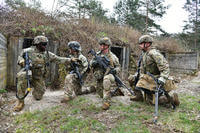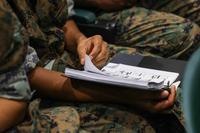Raytheon Co., the world's largest missile maker, won the U.S. Defense Department's biggest contract last month, a potential $1.6 billion deal to build advanced radar for new naval destroyers.
The Waltham, Mass.-based company received a Navy contract to develop the air and missile defense radar for Arleigh Burke-class destroyers beginning in 2016, according to the Oct. 10 announcement.
Raytheon beat out Bethesda, Md.-based Lockheed Martin Corp. and Falls Church, Va.-based Northrop Grumman Corp. for the work, most of which will be performed at the company's Sudbury, Mass., site.
The award topped a list of more than 180 contracts announced in October, with a combined value of more than $17 billion, according to a Military.com analysis of the Pentagon’s daily contract announcements. That figure doesn’t reflect what is actually spent, or obligated, because many deals are only partially funded at first.
The total is less than a third of the value of agreements announced in September, which is typically the busiest time of year for federal contracting as employees rush to ink deals before the Sept. 30 end of the fiscal year. The trend was likely exacerbated this year by the federal government shutdown.
Some of the contracts announced in October were actually awarded in September because of the 16-day partial shutdown beginning Oct. 1. During that time, much of the Pentagon's contracting workforce was forced to take leaves of absences, known as furloughs.
Raytheon last month received defense contracts totaling about $2.5 billion -- the most of any single company.
The radar deal was seen as particularly important for the defense contractor, given the pending downturn in military spending. Another round of automatic budget cuts, known as sequestration, will slice $52 billion from the Pentagon's budget beginning Jan. 1 unless lawmakers can agree on an alternative deficit-reduction plan.
"Raytheon has once again secured business in a new area at a time when rivals are seeing their revenues decline," Loren Thompson, chief executive officer of Source Associates, a for-profit defense consultancy, told The Boston Globe after the Navy announced the contract. "It’s nearly impossible to grow market share in a defense downturn, and Raytheon is managing to do it.”
The cost-reimbursable contract is initially worth $386 million, but includes options that could increase its value to as much as $1.6 billion.
The radar is designed for DDG 51 Flight III-class ships to work with the Aegis combat system to more accurately detect and intercept incoming missiles. Known as an AMDR-S, the radar consists of an S-band radar, an X-band radar and a radar suite controller, according to a separate announcement from Raytheon.
United Launch Services LLC, a joint venture of Lockheed and Chicago-based Boeing Co., won the second-largest defense contract last month, a $1 billion deal with the Air Force to assure successful launches of Atlas and Delta rockets carrying military and spy satellites, according to the Oct. 1 announcement.
Two out of the top five awards in October were so-called multiple-award contracts. Under these kinds of arrangements, companies win seats on the contract, then compete against each other for individual orders.
A group of more than a dozen companies, including Arlington, Va.-based CACI International Inc. and Falls Church, Va.-based General Dynamics Corp., shared the third-largest military award last month, a $900 million agreement with the Navy for information-technology equipment and services, according to the Oct. 3 announcement.
Another group of a half-dozen companies, including Atlantic Diving Supply Inc. of Virginia Beach, Va., shared the fourth-largest defense contract in October, a $872 million deal with the Defense Logistics Agency to provide logistics support for fire and emergency services equipment, according to the Oct. 31 announcement.
Harris Corp., based in Melbourne, Fla., worked out a deal with the Army to increase the value of an existing contract to $847 million to supply radios to Saudi Arabia, Poland, Czech Republic, El Salvador, Latvia and Romania under the Foreign Military Sales program, according to the Oct. 8 announcement.
In such a sale, the U.S. buys weapons or equipment on behalf of a foreign government. Countries approved to participate in the program may obtain military hardware or services by using their own funding or money provided through U.S.-sponsored assistance programs, according to the Defense Security Cooperation Agency.








